英语为非母语和特殊教育-AdvocatesforChildren
以孩子是否要学习更多的技能英语作文八下

以孩子是否要学习更多的技能英语作文八下Should Children Learn More Skills?In today's fast-paced and competitive world, the question of whether children should learn more skills is a hotly debated topic. Some argue that children should focus on academics and traditional subjects, while others believe that learning a diverse range of skills is crucial for success. In my opinion, I believe that children should be encouraged to learn more skills, as it can greatly benefit them both academically and personally.Firstly, learning more skills can help children develop awell-rounded personality and a wide range of interests. By engaging in activities such as music, sports, art, and language learning, children can discover their passions and talents, which can help them boost their self-esteem and confidence. Moreover, learning different skills can also help children become more creative, innovative, and adaptable, as they are exposed to new ideas and perspectives that can broaden their horizons.Secondly, learning more skills can enhance children's academic performance. Studies have shown that children who participate in extracurricular activities tend to have higher levels of academic achievement, as these activities can improve theircognitive abilities, concentration, and problem-solving skills. For example, playing a musical instrument can enhance a child's mathematical abilities, while learning a new language can improve their memory and language skills.Furthermore, learning more skills can also help children develop important life skills such as teamwork, leadership, time management, and communication skills. By participating in group activities and working with others, children can learn how to collaborate, negotiate, and resolve conflicts, which are essential skills for success in today's interconnected world. Additionally, learning new skills can teach children the value of perseverance, hard work, and dedication, as they face challenges and setbacks while trying to master a new skill.In conclusion, I believe that children should be encouraged to learn more skills, as it can have numerous benefits for their personal and academic development. By engaging in a diverse range of activities, children can discover their passions, enhance their academic performance, and develop important life skills that will serve them well in the future. Therefore, parents, teachers, and society as a whole should support and encourage children to explore and learn new skills, as it can have a positive impact on their overall development and future success.。
雅思英语作文 learning a foreign language 孩子上学就应该开始学习外语吗?
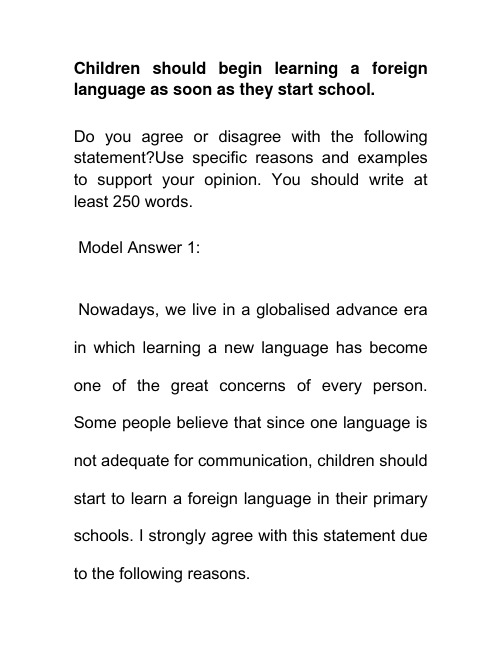
Children should begin learning a foreign language as soon as they start school.Do you agree or disagree with the following statement?Use specific reasons and examples to support your opinion. You should write at least 250 words.Model Answer 1:Nowadays, we live in a globalised advance era in which learning a new language has become one of the great concerns of every person. Some people believe that since one language is not adequate for communication, children should start to learn a foreign language in their primary schools. I strongly agree with this statement due to the following reasons.First of all, if someone wants to see outcome soon, one must start sooner. To be more precise, brain ability in learning new language reduces with growing up. Additionally, scientists claim that unlike the misconception of parents, children do not confuse the words of their mother tongue with a studied language, but they learn more efficiently. Secondly, learning a new language can broaden children’s horizon because of enhancing their social skills. When they learn a foreign language, they become more interested in that country and can make a connection with more easily. Moreover, they can cope with their future issues related to their fieldof study by having access to the variety of sources presented in their second language.When children start their early education, their minds remain fresh and they can catch more information. It is the ideal time to learn a new language so they can master the language in short time. Besides, they do not learn a language all of a random. Rather this is decided by the parents, teacher and that has a cultural perspective that the children should learn at the earlier stage rather than the later stages of life.Finally, adults always are afraid of making mistakes when they learn a new language andthis fear is one of the biggest barriers in this process. Moreover, they are always distracted with their problems related to their work, family and etc. Therefore, they need more efforts in comparison to the children.Model Answer 2:Language is the best means of communication. In the modern globalisation era, it is not enough to be able to speak one language to communicate with the outside world. I strongly support the idea that children should begin learning a foreign language as soon as they start school. They faster become familiar with astrange language, improve their hearing ability to understand new words as time goes by and learn new words. In the following paragraphs, I will list some reasons to support my position. First of all, if one wants to see outcome soon, one must start sooner. So, the early children begin to learn a new language the better will be the result. Scientists say that a child does not confuse two different languages but learns them more effectively. If children learn a foreign language at an early age, then he/she can cope with the different cultures and enjoy a better position to read more books written in foreign language. Second, adults are often afraid tomake mistakes when they are speaking in a new language. This fear is one of the biggest barriers for a person in his efforts to speak freely. Otherwise, children do not afraid of making grammatical mistakes because basically they just repeat words and sentences in the way they hear them. Also, children have a better chance to get rid of an accent. They faster get used to the right pronunciation and better feel the melody of a language. To sum up, I think that it is essential for children to begin learning a foreign language in their early ages. It brings many benefits such as great pronunciation. Also,it helps a child develop and gain more knowledge which is good for a long run.Model Answer 3:Today, learning foreign languages is a great beneficial skill because we live in a communicated era and knowing different languages makes communication easier, therefore I personally agree that foreign language should be taught to children as early as possible.Firstly, human brain ability will decrease when they grow up. Several recent research indicatesthat children can memorise and understand new languages automatically after they are born until 4 years, and afterwards, this ability will decrease. So adults need more efforts to learn such things. As a result, it is better that somebody trains them as soon as they start school.Furthermore, in this age children do not have any involvement in important tasks or problems, because they do not have any responsibility to worry about and can concentrate on their study, they can learn new things quickly and more efficiently. On the contrary, adults concern about jobs, earning, future, personal and social life andmany other things. Also, they can learn another language more easily in their childhood than in adolescence period.Finally, some people disagree with this matter and claim that the other subjects are more important than learning foreign languages and it is better that teachers allocated the time of this subject to another field such as mathematics and science, however, researchers believe that learning a foreign language help to improve other skills, since it is very challenging and enhance the brain’s abilities.In conclusion, I personally think, children should learn another language as soon as possible because their brains are more ready to understand new information and also they have less distraction when they study.Model Answer 4:It is believed that the best time to learn a foreign language is at the early age. Therefore, some people think children should be taught new language as they start school. I personally disagree with the statement, since the children might get stressed, and there are other lessons which are more important than a foreignlanguage. The following paragraphs will explain some of the reasons in detail.Firstly, it is undeniable that children start their formal education at an early age these days. Some parents have registered their children at the age of three or four, but others have enrolled their children at the age of two. During these periods, children are in the process of learning their mother tongue language. They are still learning the alphabetical words, pronunciation, grammar and vocabularies of their native languages. If the children are then taught a newlanguage, then there is a risk that the children might get mixed up or confused.Secondly, the early-aged children should focus on learning other important things, besides a new language. They should learn subjects like arts and sport. Art is an essential subject for the children as it teaches them about colours and creativities, while sports are also vital for the development of the children’s physical appearance. Besides that, it is also important to teach the children about numbers as well, as it is beneficial for their further studies.In conclusion, I personally disagree that the children should learn a foreign language at the early age. It is better for the children to focus on their native language first, and there are other subjects which are more important for them to learn.。
英语选择性作文模板

英语选择性作文模板英文回答:In the realm of education, the question of whether students should be permitted to use their native languagein the classroom has been a topic of considerable debate. Advocates of such a policy argue that it empowers students by fostering a sense of cultural identity and enabling them to express themselves more effectively. Opponents, on the other hand, contend that it may create a divide between native and non-native speakers, hinder the acquisition of the target language, and ultimately compromise academic standards.Proponents of allowing students to use their native language in the classroom emphasize the importance of cultural identity and self-expression. They argue that students who are able to use their native language feel more comfortable and confident in the learning environment. This sense of belonging can enhance motivation and create amore supportive and inclusive atmosphere. Additionally, they maintain that using one's native language facilitates more nuanced and effective communication, allowing students to convey complex ideas and emotions that may be difficult to express in the target language.Opponents of such a policy, however, raise concerns about the potential for division and the impact on language acquisition. They argue that allowing students to use their native language may create a situation where native speakers form exclusive groups, isolating non-native speakers and hindering their integration into the classroom community. Furthermore, they contend that the use of native languages may impede the development of proficiency in the target language. Students may become less motivated to engage with the target language if they are able to rely on their native language as a fallback.Ultimately, the decision of whether or not to allow students to use their native language in the classroom is a complex one that must be considered in the context of each individual situation. There is no one-size-fits-allsolution, and the most appropriate approach may vary based on factors such as the students' proficiency in the target language, the size and composition of the class, and the overall educational goals. In making this decision, it is essential to weigh the potential benefits of empowering students and fostering cultural diversity against the risks of creating division and compromising academic standards.中文回答:关于是否允许学生在课堂上使用母语的问题,一直是教育领域争论的焦点。
支教内容英文作文带翻译
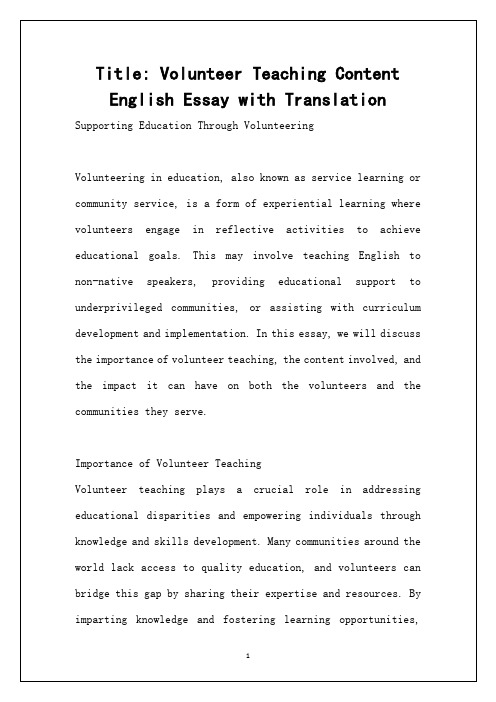
志愿教学的内容
志愿教学的内容通常侧重于语言能力,识字技能和专业知识。对于英语教学,志愿者可能会制定教案,进行语言评估,并促进语言学习活动,如阅读,写作,口语和听力练习。他们还可以将文化和社会主题纳入课程,以提供全面的学习体验。
除了语言教学,志愿者还可以在其他学科领域提供教育支持,如数学,科学和社会学。这可能涉及辅导,指导或家庭作业帮助,以帮助学生掌握基本概念并提高他们的学业表现。志愿者还可以协助开发教学材料,组织教育活动,并实施课外活动,以丰富学习环境。
Importance of Volunteer Teaching
Volunteer teaching plays a crucial role in addressing educational disparities and empowering individuals through knowledge and skills development. Many communities around the world lack access to quality education, and volunteers can bridge this gap by sharing their expertise and resources. By imparting knowledge and fostering learning opportunities,volunteers can help improve literacy rates, enhance language proficiency, and promote academic success.
孩子们是否应该学习更多的技能英语作文

The Necessity of Enriching Children's Skillset In today's rapidly evolving world, the question of whether children should learn more skills has become increasingly pertinent. With technology advancing at an unprecedented rate and the job market constantly shifting,it's crucial that our younger generation possesses adiverse skillset to navigate the complexities of the future. Firstly, learning multiple skills equips children with adaptability. As the world becomes more interconnected and competitive, the ability to adapt to changing environments and circumstances is paramount. By acquiring a wide rangeof skills, children become more resilient and versatile, able to pivot when faced with new challenges or opportunities.Secondly, multiple skills enhance children's problem-solving abilities. In the modern world, problems often require interdisciplinary approaches. By having a broad skillset, children are able to draw from various perspectives and techniques to find innovative solutions. This cross-pollination of ideas and methods fosterscreativity and innovation, vital qualities in today's knowledge-based economy.Moreover, learning more skills prepares children for a future where job roles and responsibilities are becoming increasingly blurred. With the rise of the gig economy and remote work, individuals are expected to wear multiple hats and perform a variety of tasks. By acquiring multiple skills, children are better prepared to take on these evolving roles and seize the opportunities they present.Additionally, learning more skills instills a sense of confidence and accomplishment in children. As they master new skills, they gain a sense of agency and autonomy, knowing that they have the ability to learn and grow. This confidence boosts their motivation to continue learning and exploring, leading to a lifelong love of learning.However, it's important to strike a balance. While it's beneficial for children to learn multiple skills, it's crucial that they are given the opportunity to focus on their interests and passions. Overloading them with too many activities or classes can lead to stress and burnout, affecting their overall well-being. It's essential toencourage children to explore different areas, but also to allow them to pursue their own interests and develop their unique talents.In conclusion, learning more skills is beneficial for children in numerous ways. It equips them with adaptability, problem-solving abilities, and a sense of confidence and accomplishment. As we prepare our children for the future,it's important to cultivate a mindset of continuouslearning and exploration, encouraging them to acquire a diverse skillset that will serve them well in theirpersonal and professional lives.**丰富孩子们的技能集的必要性**在当今快速发展的世界中,孩子们是否应该学习更多技能的问题变得越来越重要。
家长是否需要参加育儿培训的英语作文

The topic of whether parents should participate in parenting training has long been debated. With the evolving nature of child development and the complexity of modern parenting challenges, it is becoming increasingly important for parents to acquire knowledge and skills to effectively raise their children. In this essay, I will delve into the necessity of parental participation in parenting training from multiple perspectives, adhering to high-quality and high-standard analysis.Firstly, parenting training provides parents with essential knowledge about child development. Children grow and develop rapidly, and each stage presents unique challenges and opportunities. Parenting training equips parents with a solid understanding of these developmental stages, enabling them to identify and respond to their children's needs appropriately. This knowledge is crucial for promoting healthy cognitive, emotional, and social development in children.Secondly, parenting training helps parents navigate the complexities of modern parenting. In today's world, parents are bombarded with information and advice from various sources, often conflicting and confusing. Parenting training offers a structured and comprehensive approach to sorting through this information and applying it to real-life situations. It teaches parents practical strategies for managing behavior, setting boundaries, and fostering positive communication with their children.Thirdly, parenting training promotes positive parent-child relationships. Effective communication and positive reinforcement are essential for building strong parent-child bonds. Through training, parents learn to listen actively, empathize with their children's feelings, and provide positive feedback and encouragement. These skills enhance the quality of parent-child interactions, fostering a sense of trust, security, and mutual respect.Moreover, parenting training also addresses issues related to mental health and well-being. Children's mental health is often intricately linked to their home environment and the parenting practices employed. Training can help parents identify signs of stress, anxiety, or other mental health concerns in theirchildren and provide them with strategies to address these issues effectively. This early intervention can prevent the escalation of problems and promote long-term well-being in children.Furthermore, parenting training serves as a platform for parents to share experiences, learn from each other, and build a support network. The process of raising children can be isolating and overwhelming at times, but being part of a community of parents who are going through similar experiences can provide invaluable support and encouragement. Through training, parents can connect with others, share tips and strategies, and find solace in the knowledge that they are not alone in their parenting journey.Finally, it is worth noting that parenting training is not a one-time event but a continuous process of learning and growth. As children grow and develop, new challenges and opportunities arise, and parents need to adapt their parenting practices accordingly. By participating in ongoing training and education, parents can stay updated with the latest research and best practices in child development and parenting, ensuring that they are equipped to meet the needs of their changing children.In conclusion, the necessity of parental participation in parenting training is evident from multiple perspectives. It provides parents with essential knowledge about child development, helps them navigate the complexities of modern parenting, promotes positive parent-child relationships, addresses mental health concerns, and fosters a community of support. By investing in their own parenting education, parents can enhance the quality of life for both themselves and their children, creating a healthier, happier, and more fulfilling family environment. Therefore, it is highly recommended that parents actively engage in parenting training to equip themselves with the skills and knowledge necessary to raise happy, healthy, and successful children.。
Learning a foreign language 孩子们最好从小学开始学习外语吗 英语作文

Some experts believe that it is better for children to begin learning a foreign language at primary school rather than secondary school. Do the advantages of this outweigh the disadvantages?To what extent do you agree or disagree? Give reasons for your answer and include any relevant examples from your experience.You should write at least 250 words.Model Essay 1:We live in an advanced and globalised world which necessitates that all people must learn a foreign language to cope with the modern trend. The optimum age for learning a new language isa matter of public debate which in my opinion is better to start as early as possible as the advantages of it are far more than the disadvantages.On one hand, the main disadvantages of teaching children another language at primary school are that - firstly, it could affect their ability to learn their mother tongue properly and they might get confused by learning many different languages with different grammar and pronunciation at the same time. Secondly, it could be a waste of their study time which could be spent on learning core subjects such asmathematics, sciences, technology etc. Finally, the learning of foreign language adds more loads on these young kids and takes some of their fun time.On the other hand knowing a foreign language at a young age is easier and need less time than learning at an older age. The children could pick up the pronunciation more easily as they learn it sub-consciously.Also, they learn with no shy and talk freely without any fear of making mistakes. Moreover teaching young children foreign language has a positive impact on their personality as itbroadens their horizon and improves their social skills in dealing with foreign people and exposing them a wide range of cultures.Furthermore they will benefit from knowing a foreign language in their upcoming studies and work career as well, and still, they could find learning new language enjoyable for example: use some games and illustration for them as a teaching method.In conclusion, learning, an international language is demanding skill that I think it should be starting at primary school as the benefits outweigh the drawbacks.。
关于孩子们是否需要课外班的作文英文

The Necessity of Extra-Curricular Classes forChildrenIn today's fast-paced academic world, the question of whether children need extra-curricular classes has gained prominence. While some argue that these classes burden the children with unnecessary pressure, others maintain that they provide valuable opportunities for personal growth and development. In my opinion, extra-curricular classes are indeed beneficial for children, but the choice should be made based on the child's interests and abilities.Firstly, extra-curricular classes provide children with a platform to explore their interests beyond the conventional school curriculum. For instance, a child whois passionate about music can enroll in music classes, while a child interested in science can participate in science clubs or workshops. These classes not only help them develop their hobbies but also encourage them to pursue their passions.Moreover, extra-curricular activities help children develop important life skills such as teamwork, leadership, and problem-solving. These skills are crucial for theirfuture success, as they prepare children to workeffectively in groups and handle real-world challenges. Through these classes, children learn to work together, take responsibility, and make informed decisions.However, it is essential to recognize that not all children need or want extra-curricular classes. Some children may prefer to focus on their school studies and enjoy their free time without the added pressure of attending classes outside school. It is important to respect their choices and allow them to follow their own paths.Additionally, parents should ensure that the extra-curricular classes they choose for their children align with their interests and abilities. Forcing a child to attend classes they do not enjoy or are not suited for can be counterproductive, leading to disinterest and frustration. Instead, parents should encourage their children to explore different activities and find what they are passionate about.In conclusion, extra-curricular classes can be beneficial for children, providing them with opportunitiesto explore their interests, develop important life skills, and prepare for future challenges. However, the choice should be made based on the child's preferences and abilities, ensuring that they are not burdened with unnecessary pressure. By respecting their choices and encouraging their passions, we can foster a generation of well-rounded, engaged, and happy learners.**孩子们是否需要课外班的思考**在当今快节奏的学术环境中,孩子们是否需要课外班的问题日益凸显。
2023年下半年幼儿教资作文打卡
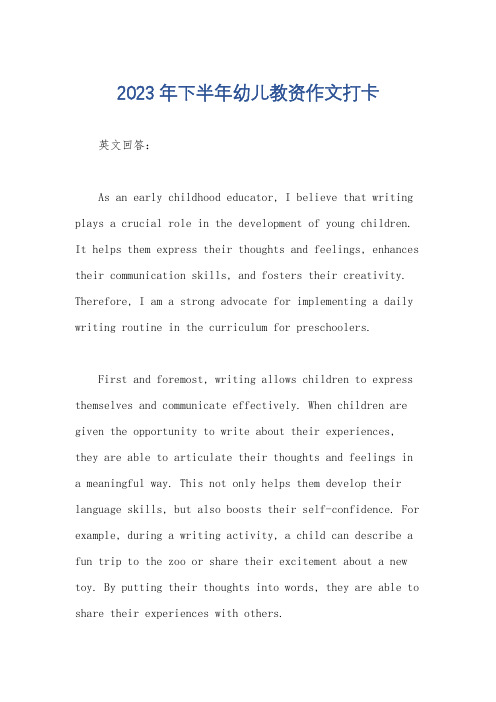
2023年下半年幼儿教资作文打卡英文回答:As an early childhood educator, I believe that writing plays a crucial role in the development of young children. It helps them express their thoughts and feelings, enhances their communication skills, and fosters their creativity. Therefore, I am a strong advocate for implementing a daily writing routine in the curriculum for preschoolers.First and foremost, writing allows children to express themselves and communicate effectively. When children are given the opportunity to write about their experiences, they are able to articulate their thoughts and feelings in a meaningful way. This not only helps them develop their language skills, but also boosts their self-confidence. For example, during a writing activity, a child can describe a fun trip to the zoo or share their excitement about a new toy. By putting their thoughts into words, they are able to share their experiences with others.In addition, writing encourages creativity and imagination in young children. When children are encouraged to write stories, they are able to let their imaginations run wild. They can create characters, develop plots, and explore different settings. This not only enhances their storytelling abilities, but also nurtures their creativity. For instance, a child may write a story about a magical unicorn who goes on adventures in a faraway land. Through writing, they can bring their imaginary world to life and share it with others.Moreover, writing helps children develop important cognitive skills. When children engage in writing activities, they are required to think critically, organize their thoughts, and sequence their ideas. This promotes their problem-solving abilities and enhances their logical thinking skills. For example, when writing a persuasive letter, a child needs to think about their arguments, organize them in a logical order, and present them effectively. Through this process, they are able to develop their cognitive abilities and become more effectivethinkers.中文回答:作为一名幼儿教育工作者,我相信写作在幼儿的发展中起着至关重要的作用。
小作文 应该让孩子从小学习外语吗 三百字
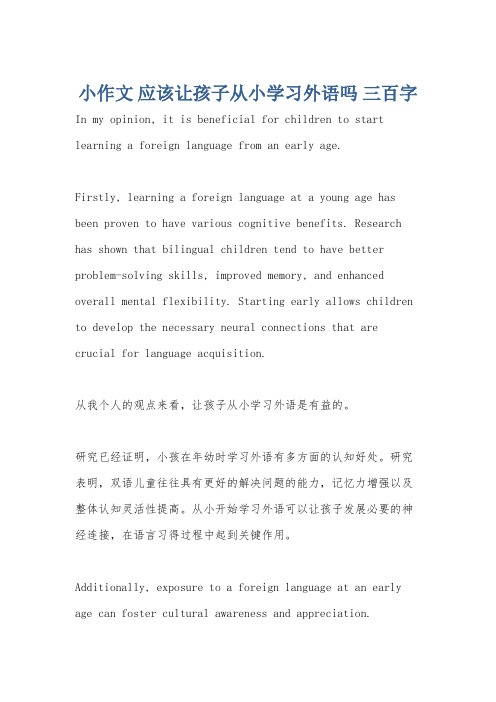
小作文应该让孩子从小学习外语吗三百字In my opinion, it is beneficial for children to start learning a foreign language from an early age.Firstly, learning a foreign language at a young age has been proven to have various cognitive benefits. Research has shown that bilingual children tend to have better problem-solving skills, improved memory, and enhanced overall mental flexibility. Starting early allows children to develop the necessary neural connections that are crucial for language acquisition.从我个人的观点来看,让孩子从小学习外语是有益的。
研究已经证明,小孩在年幼时学习外语有多方面的认知好处。
研究表明,双语儿童往往具有更好的解决问题的能力,记忆力增强以及整体认知灵活性提高。
从小开始学习外语可以让孩子发展必要的神经连接,在语言习得过程中起到关键作用。
Additionally, exposure to a foreign language at an early age can foster cultural awareness and appreciation.Learning about different cultures and languages not only broadens a child's perspective but also promotes empathy and tolerance. It enables them to communicate and connect with people from diverse backgrounds, enhancing their social skills and global understanding.早期接触一门外语还能培养文化意识和欣赏能力。
特殊教育老师帮助特殊儿童的英语作文

特殊教育老师帮助特殊儿童的英语作文Special education teachers play a crucial role in helping children with special needs to reach their full potential. These dedicated professionals provide support, guidance, and education to students who may face challenges in traditional learning environments. In this essay, I will discuss the important role that special education teachers play in supporting special needs children and the impact they have on these students' lives.Special education teachers are trained to work with students who have a wide range of disabilities, including learning disabilities, physical disabilities, and developmental delays. These teachers use specialized techniques and strategies to help students overcome their challenges and succeed academically and socially. They may work with students one-on-one or in small groups, providing individualized instruction and support tailored to each student's unique needs.One of the key responsibilities of special education teachers is to create and implement individualized education plans (IEPs) for each student with special needs. These plans outline the student's strengths and weaknesses, set specific goals and objectives, and define the interventions and accommodations needed to support the student's learning and development.Special education teachers collaborate with parents, school administrators, and other professionals to ensure that the IEP is effectively implemented and that the student receives the necessary support and services.In addition to academic support, special education teachers also play a crucial role in helping special needs children develop important life skills and social skills. They may teach students how to communicate effectively, manage their emotions, and navigate social situations. Special education teachers create a safe and supportive learning environment where students can build self-confidence, develop independence, and form positive relationships with their peers.One of the most rewarding aspects of being a special education teacher is seeing the progress and growth that students make. Special education teachers celebrate small victories and milestones with their students, whether it's mastering a new skill, improving their grades, or making a new friend. These teachers provide encouragement, motivation, and a sense of hope to students who may have faced obstacles and setbacks in the past.Special education teachers also play an important advocacy role, ensuring that students with special needs receive thesupport and resources they need to thrive. They may advocate for appropriate accommodations and assistive technologies, collaborate with community organizations and agencies, and raise awareness about the needs of special needs children. Special education teachers are fierce advocates for their students, fighting for their rights and opportunities to succeed.In conclusion, special education teachers play a critical role in supporting special needs children and helping them reach their full potential. These dedicated professionals provide academic support, life skills training, and social-emotional guidance to students with disabilities, empowering them to overcome their challenges and achieve success. Special education teachers are passionate, compassionate, and committed to making a positive difference in the lives of special needs children. Their work is truly inspiring and essential to creating a more inclusive and equitable society for all.。
教偏远地区儿童学习英语的作文
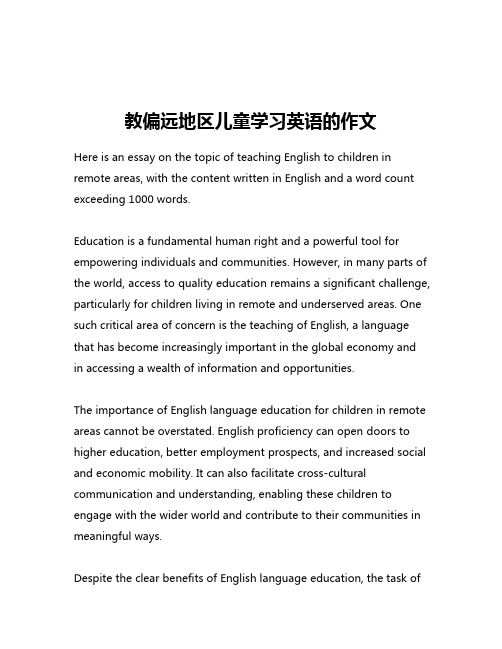
教偏远地区儿童学习英语的作文Here is an essay on the topic of teaching English to children in remote areas, with the content written in English and a word count exceeding 1000 words.Education is a fundamental human right and a powerful tool for empowering individuals and communities. However, in many parts of the world, access to quality education remains a significant challenge, particularly for children living in remote and underserved areas. One such critical area of concern is the teaching of English, a language that has become increasingly important in the global economy and in accessing a wealth of information and opportunities.The importance of English language education for children in remote areas cannot be overstated. English proficiency can open doors to higher education, better employment prospects, and increased social and economic mobility. It can also facilitate cross-cultural communication and understanding, enabling these children to engage with the wider world and contribute to their communities in meaningful ways.Despite the clear benefits of English language education, the task ofreaching and effectively teaching children in remote areas presents a unique set of challenges. These areas are often characterized by limited infrastructure, scarce resources, and a lack of qualified teachers, all of which can hinder the delivery of quality education.One of the primary obstacles in providing English language education to children in remote areas is the shortage of skilled and motivated teachers. Many remote communities struggle to attract and retain qualified educators, who may be deterred by the logistical difficulties and limited resources available in these locations. This challenge is compounded by the fact that teaching English as a foreign language requires specialized training and pedagogical approaches that may not be readily available in these underserved regions.To address this issue, a multifaceted approach is necessary. Governments and educational authorities must prioritize the recruitment, training, and retention of teachers who are equipped to deliver effective English language instruction in remote settings. This may involve offering incentives, such as higher salaries, housing, and professional development opportunities, to attract and retain qualified teachers.Additionally, the use of technology-based solutions can be a powerful tool in overcoming the challenges of distance and limitedresources. Online learning platforms, interactive educational materials, and virtual classrooms can provide children in remote areas with access to high-quality English language instruction, even in the absence of physical teachers. By leveraging digital technologies, educators can reach a wider audience, deliver personalized learning experiences, and ensure continuity of education, even in the face of logistical barriers.Another key aspect of successful English language education in remote areas is the involvement and support of the local community. Engaging parents, community leaders, and other stakeholders in the educational process can help ensure that the curriculum and teaching methods are culturally relevant and responsive to the needs of the local population. This can also foster a sense of ownership and investment in the success of the program, which is crucial for its long-term sustainability.Furthermore, the integration of English language education with broader initiatives aimed at improving the overall quality of education in remote areas is essential. This may include investments in infrastructure, such as the construction of schools and the provision of basic amenities, as well as the development of comprehensive educational programs that address the diverse needs of children, including their social, emotional, and physical well-being.By adopting a holistic and collaborative approach, the challenges of providing English language education to children in remote areas can be addressed effectively. This will not only empower these children with a valuable skill but also contribute to the broader goal of ensuring equitable access to quality education for all, regardless of their geographic location or socioeconomic status.In conclusion, the task of teaching English to children in remote areas is a complex and multifaceted challenge, but one that is essential for promoting social and economic development, fostering cross-cultural understanding, and unlocking the boundless potential of these young learners. Through a combination of innovative approaches, strategic investments, and community engagement, we can work towards ensuring that every child, regardless of their geographic location, has the opportunity to acquire the language skills necessary to thrive in the global landscape.。
申请志愿帮助孩子学习英语的英语作文
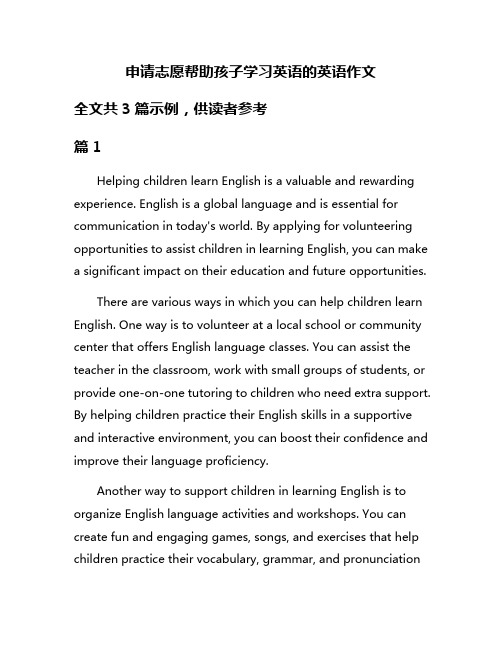
申请志愿帮助孩子学习英语的英语作文全文共3篇示例,供读者参考篇1Helping children learn English is a valuable and rewarding experience. English is a global language and is essential for communication in today's world. By applying for volunteering opportunities to assist children in learning English, you can make a significant impact on their education and future opportunities.There are various ways in which you can help children learn English. One way is to volunteer at a local school or community center that offers English language classes. You can assist the teacher in the classroom, work with small groups of students, or provide one-on-one tutoring to children who need extra support. By helping children practice their English skills in a supportive and interactive environment, you can boost their confidence and improve their language proficiency.Another way to support children in learning English is to organize English language activities and workshops. You can create fun and engaging games, songs, and exercises that help children practice their vocabulary, grammar, and pronunciationskills. By making the learning process enjoyable and interactive, you can motivate children to actively participate and improve their English abilities.In addition to volunteering in a formal setting, you can also help children learn English through informal conversations and interactions. Engaging children in English conversations during everyday activities, such as playing games, cooking together, or going on outings, can help them practice their language skills in a natural and relaxed setting. By incorporating English into their daily routines, children can develop fluency and confidence in using the language.Furthermore, you can support children in learning English by providing resources and materials that facilitate their language learning. This can include books, flashcards, worksheets, and online resources that cater to different learning styles and abilities. By giving children access to a variety of learning materials, you can help them explore and practice English in a way that suits their individual needs and preferences.Overall, volunteering to help children learn English is a meaningful and impactful way to contribute to their education and personal development. By sharing your knowledge, skills, and enthusiasm for the English language, you can empowerchildren to communicate effectively, pursue academic opportunities, and connect with people from different cultures around the world. Your dedication and commitment to supporting children in learning English can make a lasting difference in their lives and inspire them to reach their full potential.篇2Applying for volunteer help to assist children in learning EnglishThe ability to speak English has become increasingly important in today's globalized society. Not only does it facilitate communication with people from all over the world, but it also opens up a world of opportunities in terms of education and employment. As such, it is crucial for children to start learning English at a young age in order to develop strong language skills.Unfortunately, not all children have access to the resources and support they need to learn English effectively. This is where volunteers can play a crucial role in helping children improve their English proficiency. By providing one-on-one support, volunteers can help children practice their speaking, listening, reading, and writing skills in a fun and engaging way.As a parent, I am deeply committed to providing my child with the best possible education. I understand the importance of learning English and the doors it can open for my child in the future. However, I also recognize that I may not have the expertise or time to help my child learn English effectively on my own.Therefore, I am seeking volunteer help to assist my child in learning English. I believe that with the help of a dedicated volunteer, my child will be able to improve his language skills and develop a strong foundation in English. I am looking for a volunteer who is passionate about teaching and who can provide personalized support to help my child reach his full potential.If you are interested in volunteering to help my child learn English, please contact me at your earliest convenience. I am confident that with your support, my child will be able to excel in English and achieve his academic and personal goals. Thank you for considering my request for volunteer assistance.篇3Applying for Volunteering to Help Children Learn EnglishIntroductionEnglish is considered one of the most widely spoken languages in the world. It is the language of international communication, business, and diplomacy. For children to be successful in the globalized world, it is crucial for them to have a strong command of the English language. However, not all children have access to quality English language education. As a result, many children struggle to learn English and are at a disadvantage compared to their peers. In order to address this issue, I have decided to apply for volunteering to help children learn English.Motivation for VolunteeringI have always been passionate about education and believe that every child deserves the opportunity to excel academically. I have seen firsthand the struggles that children face when they do not have access to quality education, and I believe that I can make a difference by volunteering to help children learn English. By volunteering my time and skills, I hope to empower children with the knowledge and resources they need to succeed in the future.Benefits of Learning EnglishLearning English opens up a world of opportunities for children. It allows them to communicate with people fromdifferent countries and cultures, broadens their horizons, and enhances their cognitive skills. Moreover, English is the language of the internet, which means that proficiency in English can give children access to a wealth of information and resources online. In today's interconnected world, proficiency in English is a valuable asset that can open doors to a wide range of opportunities for children.Volunteering ExperienceI have previous experience volunteering with children, and I have always found it to be a rewarding and fulfilling experience. By volunteering to help children learn English, I will be able to combine my passion for education with my desire to make a positive impact in the lives of others. I am confident that I have the skills and dedication necessary to support children in their English language learning journey and help them achieve academic success.Goals and ObjectivesMy goal as a volunteer is to create a supportive and engaging learning environment where children feel motivated and confident to learn English. I will tailor my teaching methods to suit the needs and learning styles of each child, and I will provide them with the resources and support they need tosucceed. I aim to help children improve their English language skills, build their confidence, and foster a love for learning that will stay with them throughout their lives.ConclusionIn conclusion, I am applying for volunteering to help children learn English because I believe that every child deserves the opportunity to achieve their full potential. By volunteering my time and skills, I hope to empower children with the knowledge and resources they need to succeed in the globalized world. I am excited about the opportunity to make a positive impact in the lives of children through volunteering, and I look forward to contributing to their academic success and personal growth. Thank you for considering my application.。
现在有很多家长送孩子上培训班英语作文
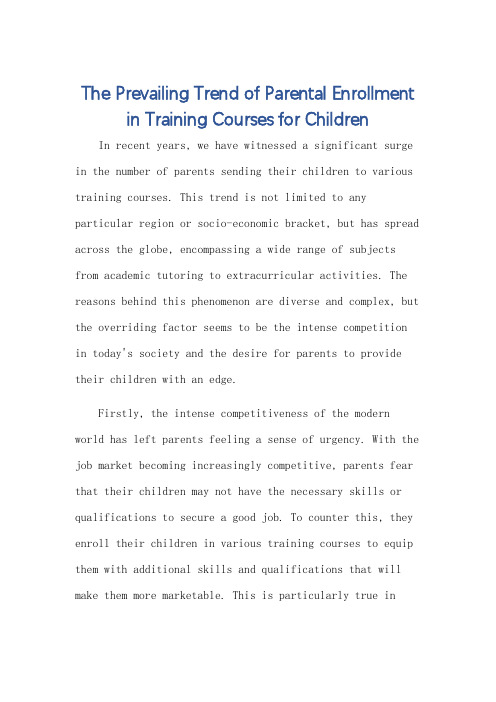
The Prevailing Trend of Parental Enrollment in Training Courses for ChildrenIn recent years, we have witnessed a significant surge in the number of parents sending their children to various training courses. This trend is not limited to any particular region or socio-economic bracket, but has spread across the globe, encompassing a wide range of subjects from academic tutoring to extracurricular activities. The reasons behind this phenomenon are diverse and complex, but the overriding factor seems to be the intense competitionin today's society and the desire for parents to provide their children with an edge.Firstly, the intense competitiveness of the modern world has left parents feeling a sense of urgency. With the job market becoming increasingly competitive, parents fear that their children may not have the necessary skills or qualifications to secure a good job. To counter this, they enroll their children in various training courses to equip them with additional skills and qualifications that will make them more marketable. This is particularly true infields such as technology, where rapid advancements require constant updating of knowledge and skills.Secondly, parents are also influenced by the "keepingup with the Joneses" syndrome. In today's society, there is a strong emphasis on academic and extracurricular achievements. Children who excel in these areas are often held up as role models, while those who lag behind may face social exclusion. As a result, parents feel pressure to ensure that their children are not left behind and enroll them in training courses to enhance their performance.However, while the intention behind sending children to training courses is noble, the consequences can sometimesbe counterproductive. Excessive emphasis on academic and extracurricular achievements can lead to excessive stress and burnout, affecting the child's physical and mental health. Moreover, it can also lead to a lack of interest in learning and a diminished sense of creativity and curiosity. Moreover, the proliferation of training courses has led to a boom in the tutoring industry, which has become a multibillion-dollar business. This has given rise to concerns about the quality of teaching and the potentialfor exploitation of children. Some training courses may focus too much on考试成绩 rather than on fostering a love for learning, leading to a narrow mindset and a lack of critical thinking skills.In conclusion, while sending children to training courses can provide them with additional skills and qualifications, it is crucial for parents to strike a balance. They should encourage their children to explore their interests and talents while also providing them with the necessary support and guidance. Additionally, parents should be mindful of the potential downsides of excessive emphasis on academic and extracurricular achievements and strive to create a nurturing and stress-free environmentfor their children to grow and learn.**家长热衷送孩子上培训班的当下趋势**近年来,我们看到越来越多的家长送孩子去参加各种培训班。
申请在假期去教偏远地区的孩子 英语作文
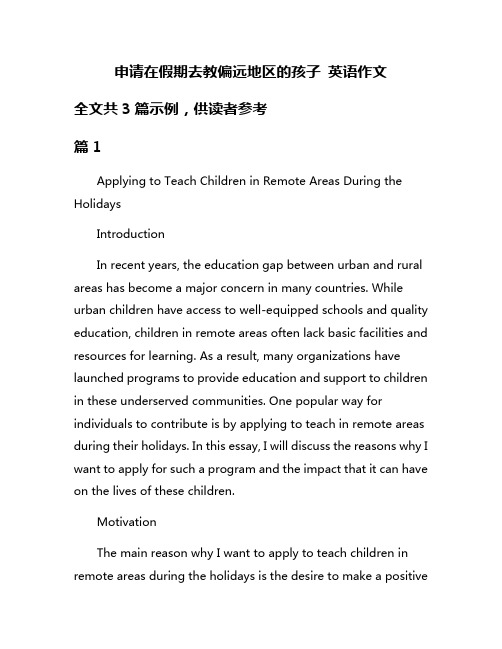
申请在假期去教偏远地区的孩子英语作文全文共3篇示例,供读者参考篇1Applying to Teach Children in Remote Areas During the HolidaysIntroductionIn recent years, the education gap between urban and rural areas has become a major concern in many countries. While urban children have access to well-equipped schools and quality education, children in remote areas often lack basic facilities and resources for learning. As a result, many organizations have launched programs to provide education and support to children in these underserved communities. One popular way for individuals to contribute is by applying to teach in remote areas during their holidays. In this essay, I will discuss the reasons why I want to apply for such a program and the impact that it can have on the lives of these children.MotivationThe main reason why I want to apply to teach children in remote areas during the holidays is the desire to make a positivedifference in their lives. Growing up in a privileged environment, I have always been aware of the educational opportunities that I have been lucky to receive. I believe that every child, regardless of their background, should have the right to a quality education. By volunteering to teach in remote areas, I hope to contribute towards bridging the education gap and give these children a chance to improve their future prospects.Furthermore, I am also motivated by the opportunity to learn and grow from the experience. Teaching in a remote area will expose me to a different environment and challenge me to adapt to new teaching methods and techniques. I believe that this experience will not only enhance my teaching skills but also broaden my perspective on education and the challenges faced by marginalized communities.ImpactTeaching children in remote areas during the holidays can have a significant impact on their lives. By providing them with an opportunity to learn and develop new skills, we can help empower them to break the cycle of poverty and improve their future prospects. Education is a powerful tool that can open doors to new opportunities and help children realize their full potential.In addition, teaching in remote areas can also help build a sense of community and foster greater social cohesion. By working closely with local teachers, parents, and community members, we can create a supportive network that values education and strives to provide the best learning environment for these children. Through collaboration and partnership, we can make a lasting impact on the lives of these children and contribute towards creating a more inclusive and equitable society.ConclusionIn conclusion, applying to teach children in remote areas during the holidays is a rewarding and meaningful experience that can make a positive difference in the lives of underserved communities. By volunteering our time and skills, we can help provide quality education to children who need it the most and empower them to build a better future for themselves. I am excited about the opportunity to apply for such a program and look forward to making a meaningful contribution to the education of these children.篇2Applying to Teach Children in Remote Areas During the HolidaysVolunteering to teach children in remote areas during the holidays can be a rewarding experience that not only benefits the children, but also helps you grow as an individual. In this essay, we will discuss the reasons for choosing to teach in remote areas, the challenges that one may face, and the benefits that come from such an experience.First and foremost, the decision to apply to teach in remote areas during the holidays is often driven by a desire to make a difference in the lives of children who may not have access to quality education. These children may come from impoverished backgrounds or may live in areas that are geographically isolated, making it difficult for them to receive a proper education. By volunteering to teach in these areas, you can help bridge the gap and provide these children with the opportunity to learn and grow.However, teaching in remote areas also comes with its own set of challenges. One of the main challenges is the lack of resources and facilities available in these areas. Schools in remote regions may be underfunded and ill-equipped, making it difficult to provide a quality education to the children.Additionally, teachers may have to deal with limited access to technology and other teaching aids, which can make it challenging to engage the students.Despite these challenges, there are numerous benefits to teaching in remote areas during the holidays. One of the main benefits is the sense of fulfillment that comes from making a positive impact on the lives of these children. By sharing your knowledge and skills with them, you can help them develop a love for learning and inspire them to reach their full potential. Additionally, teaching in remote areas can also help you develop valuable skills such as adaptability, patience, and cultural sensitivity, which can be beneficial in all aspects of your life.In conclusion, applying to teach children in remote areas during the holidays is a noble and rewarding endeavor. While it may come with its own set of challenges, the benefits far outweigh the difficulties. By volunteering to teach in remote areas, you can make a significant difference in the lives of children who may not have access to quality education, while also growing as an individual. So why not take the leap and apply to teach in a remote area this holiday season?篇3Applying to Teach Children in Remote Areas During VacationIn recent years, the disparity in educational opportunities between urban and remote areas has become increasingly prominent. As a result, many children living in remote areas lack access to quality education. Recognizing this issue, I have decided to dedicate my upcoming vacation to teaching children in these remote areas. In this essay, I will share my motivations for this decision, as well as my plans for teaching in these communities.One of the main reasons why I am passionate about teaching in remote areas is the belief that every child deserves access to quality education, regardless of their background or location. Education has the power to transform lives and open doors to opportunities, and it is unfair that some children are denied this fundamental right simply because of where they live. By teaching in remote areas, I hope to make a meaningful impact on the lives of these children and help bridge the gap in educational opportunities.Furthermore, I am eager to learn from the experiences of teaching in a different environment and to challenge myself to adapt to new situations. Teaching in remote areas will require meto be creative, resourceful, and flexible in my approach, as I may not have access to the same resources and facilities that I am accustomed to. This experience will not only enhance my teaching skills but also broaden my perspective on education and the challenges faced by different communities.In terms of my plans for teaching in remote areas, I intend to focus on providing basic literacy and numeracy skills to the children, as these are essential for their overall development. I will also incorporate interactive and engaging activities into my lessons to make learning more enjoyable and effective. Additionally, I plan to work closely with local teachers and community members to understand the specific needs and challenges of the children in these areas, so that I can tailor my teaching approach accordingly.In conclusion, I am excited about the opportunity to teach children in remote areas during my vacation and make a positive impact on their lives. By dedicating my time and energy to this cause, I hope to contribute to the goal of providing equal educational opportunities for all children, regardless of their circumstances. I believe that education is a powerful tool for empowerment and social change, and I am committed to playing my part in making a difference in the lives of these children.。
申请做志愿者去教孩子英语的英语作文
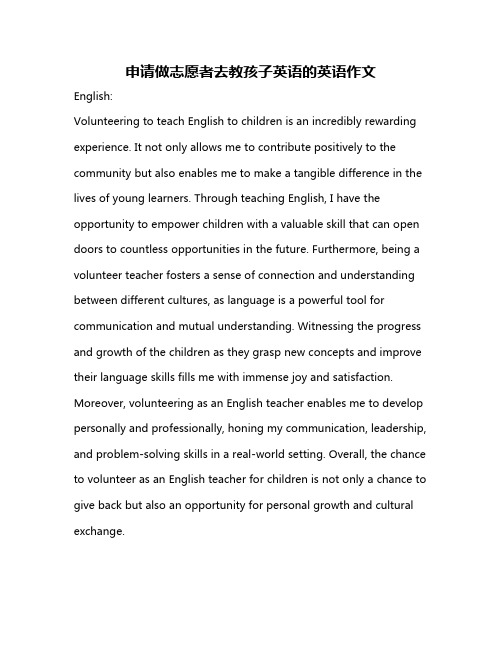
申请做志愿者去教孩子英语的英语作文English:Volunteering to teach English to children is an incredibly rewarding experience. It not only allows me to contribute positively to the community but also enables me to make a tangible difference in the lives of young learners. Through teaching English, I have the opportunity to empower children with a valuable skill that can open doors to countless opportunities in the future. Furthermore, being a volunteer teacher fosters a sense of connection and understanding between different cultures, as language is a powerful tool for communication and mutual understanding. Witnessing the progress and growth of the children as they grasp new concepts and improve their language skills fills me with immense joy and satisfaction. Moreover, volunteering as an English teacher enables me to develop personally and professionally, honing my communication, leadership, and problem-solving skills in a real-world setting. Overall, the chance to volunteer as an English teacher for children is not only a chance to give back but also an opportunity for personal growth and cultural exchange.中文翻译:做志愿者去教孩子英语是一种非常有益的经历。
孩子应不应该学习方言的英语作文
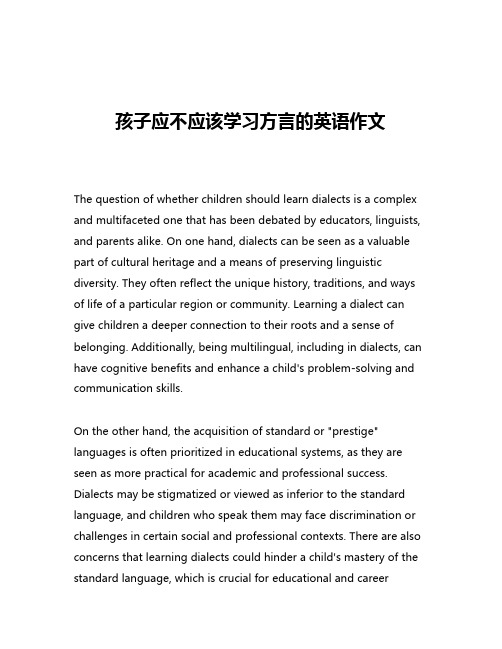
孩子应不应该学习方言的英语作文The question of whether children should learn dialects is a complex and multifaceted one that has been debated by educators, linguists, and parents alike. On one hand, dialects can be seen as a valuable part of cultural heritage and a means of preserving linguistic diversity. They often reflect the unique history, traditions, and ways of life of a particular region or community. Learning a dialect can give children a deeper connection to their roots and a sense of belonging. Additionally, being multilingual, including in dialects, can have cognitive benefits and enhance a child's problem-solving and communication skills.On the other hand, the acquisition of standard or "prestige" languages is often prioritized in educational systems, as they are seen as more practical for academic and professional success. Dialects may be stigmatized or viewed as inferior to the standard language, and children who speak them may face discrimination or challenges in certain social and professional contexts. There are also concerns that learning dialects could hinder a child's mastery of the standard language, which is crucial for educational and careeradvancement.Ultimately, the decision of whether children should learn dialects is a complex one that depends on a variety of factors, including the specific context, the educational goals and priorities of the community, and the individual needs and interests of the child.One argument in favor of children learning dialects is that they can provide a valuable link to cultural heritage and identity. Dialects often reflect the unique history, customs, and ways of life of a particular region or community. By learning a dialect, children can gain a deeper understanding and appreciation of their roots, which can foster a sense of belonging and pride. This can be particularly important for children from minority or marginalized communities, whose dialects may be threatened by the dominance of standard or majority languages.Moreover, being multilingual, including in dialects, can have cognitive benefits for children. Research has shown that multilingual individuals tend to have enhanced problem-solving skills, cognitive flexibility, and communication abilities. Learning a dialect can help children develop a more nuanced understanding of language and its variations, which can in turn improve their overall linguistic skills and awareness.However, the acquisition of standard or "prestige" languages is often prioritized in educational systems, as they are seen as more practical for academic and professional success. Dialects may be stigmatized or viewed as inferior to the standard language, and children who speak them may face discrimination or challenges in certain social and professional contexts. There are also concerns that learning dialects could hinder a child's mastery of the standard language, which is crucial for educational and career advancement.It is important to note that the relationship between dialects and standard languages is complex and often reflects power dynamics and sociopolitical factors. Standard languages are often associated with social and economic privilege, while dialects may be seen as less prestigious or "correct." This can lead to the marginalization and devaluation of dialects, which can have negative consequences for the children who speak them.In some cases, however, dialects may be actively promoted and supported within educational systems, particularly in regions where they are widely spoken and hold significant cultural and historical significance. In these contexts, learning a dialect can be seen as a valuable complement to the acquisition of the standard language, rather than a hindrance.Ultimately, the decision of whether children should learn dialects is acomplex one that requires careful consideration of the specific context, the educational goals and priorities of the community, and the individual needs and interests of the child. While there are valid arguments on both sides, it is crucial that the decision-making process is guided by principles of inclusivity, equity, and respect for linguistic diversity.One approach that may help to balance these competing considerations is to adopt a more holistic and flexible approach to language education. This could involve incorporating dialects into the curriculum in a way that complements the teaching of standard languages, rather than treating them as separate or competing entities. Additionally, educators could work to challenge the stigma and discrimination often associated with dialects, and to promote a greater appreciation for linguistic diversity and the cognitive and cultural benefits it can bring.Another important consideration is the role of families and communities in supporting children's language learning. Parents and caregivers who speak dialects can play a crucial role in transmitting this linguistic and cultural knowledge to their children, and in fostering a sense of pride and connection to their heritage. Community-based language programs and initiatives can also be valuable in this regard, providing children with opportunities to learn and practice dialects in a supportive and culturally-affirmingenvironment.Ultimately, the decision of whether children should learn dialects is a complex one that requires a nuanced and multifaceted approach. By considering the various benefits and challenges, and by adopting a more inclusive and flexible approach to language education, it may be possible to strike a balance that allows children to develop a strong command of standard languages while also preserving and celebrating the rich linguistic diversity that dialects represent.。
以学习没有语法的英语为题的作文

以学习没有语法的英语为题的作文英文回答:In the realm of language acquisition, the traditional notion of mastering grammar as the foundation for language proficiency has been challenged by a growing movement that advocates for an alternative approach: learning a language without grammar. Proponents of this approach argue that grammar is an unnecessary and often counterproductive barrier to language acquisition, and that a more immersive and natural approach can lead to greater fluency and communicative competence.The idea of learning a language without grammar is not entirely new. In fact, it is the way that most native speakers acquire their first language. Children do not study grammar rules before they start speaking, but rather learn the language through exposure and interaction. They may make mistakes along the way, but they gradually develop an intuitive understanding of the language's structure andpatterns.There are several reasons why learning a language without grammar may be more effective than the traditional grammar-based approach. First, grammar can be a difficult and confusing subject, especially for learners who are not native speakers. Trying to memorize and apply grammar rules can be overwhelming and can lead to frustration. This can discourage learners and hinder their progress.Second, grammar is often taught in a way that is divorced from real-world communication. Learners may be able to recite grammar rules, but they may not be able to apply them spontaneously in conversation. This can lead to a lack of fluency and communicative competence.Finally, focusing on grammar can lead to a focus on form over substance. Learners may become so concerned with getting the grammar right that they neglect the content of their communication. This can result in stilted and unnatural language use.In contrast, the no-grammar approach encourages learners to focus on the communicative aspects of language. This means learning how to express themselves clearly and effectively, without worrying about grammar rules. By immersing themselves in the language through listening, speaking, reading, and writing, learners can develop an intuitive understanding of the language's structure and patterns.Of course, there are some who argue that learning grammar is essential for developing accuracy and precision in language use. However, research has shown that learners who focus on grammar do not necessarily make fewer errors than those who do not. In fact, some studies have foundthat learners who focus on grammar may actually make more errors in their writing.Ultimately, the decision of whether or not to learn a language without grammar is a personal one. There is no right or wrong answer. However, for learners who are looking for a more natural and immersive approach to language acquisition, the no-grammar approach may be aviable option.中文回答:无语法学习英语。
孩子们要不要上辅导班英语作文
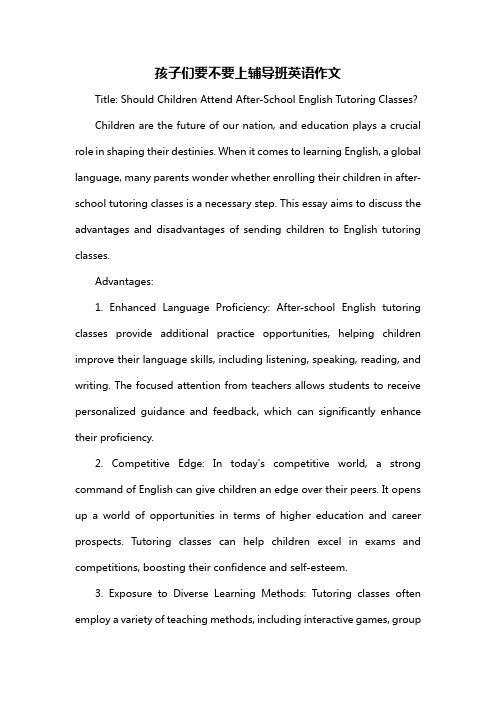
孩子们要不要上辅导班英语作文Title: Should Children Attend After-School English Tutoring Classes?Children are the future of our nation, and education plays a crucial role in shaping their destinies. When it comes to learning English, a global language, many parents wonder whether enrolling their children in after-school tutoring classes is a necessary step. This essay aims to discuss the advantages and disadvantages of sending children to English tutoring classes.Advantages:1. Enhanced Language Proficiency: After-school English tutoring classes provide additional practice opportunities, helping children improve their language skills, including listening, speaking, reading, and writing. The focused attention from teachers allows students to receive personalized guidance and feedback, which can significantly enhance their proficiency.2. Competitive Edge: In today's competitive world, a strong command of English can give children an edge over their peers. It opens up a world of opportunities in terms of higher education and career prospects. Tutoring classes can help children excel in exams and competitions, boosting their confidence and self-esteem.3. Exposure to Diverse Learning Methods: Tutoring classes often employ a variety of teaching methods, including interactive games, groupdiscussions, and multimedia resources. This exposure can make learning fun and engaging for children, fostering a lifelong love for the language.Disadvantages:1. Increased Academic Burden: Enrolling children in after-school tutoring classes adds to their academic workload, which may lead to stress and burnout. It is essential to strike a balance between academic and extracurricular activities to ensure a healthy and well-rounded development.2. Financial Strain: High-quality English tutoring classes can be expensive, putting a financial burden on families, especially those with limited resources. This may create inequality in access to quality education, widening the gap between privileged and underprivileged children.3. Overemphasis on Grades: Some tutoring classes focus solely on improving grades, which may encourage rote learning and memorization rather than fostering true understanding and application of the language. This approach can hinder the development of critical thinking and problem-solving skills.Conclusion:The decision to enroll children in after-school English tutoring classes should be based on individual needs and circumstances. While these classes can offer numerous benefits, it is essential to consider thepotential drawbacks and ensure a balanced approach to education. Ultimately, parents and educators should prioritize the overall well-being and happiness of children, fostering a love for learning and enabling them to reach their full potential.。
special education特殊教育

Stars on the earth Special education Albert Einstein Thousand-hand Guan Yin Some feelings
Stars on the earth
The film explores the life and imagination of eightyear-old Ishaan . Although he excels in art, his poor academic performance leads his parents to send him to a boarding school. Ishaan's new art teacher suspects that he is dyslexic(诵读困难的), and helps him to overcome his disability.
2.Never single out a person just because of their handicap, disability or need. Each of us is unique and different.
3.Respect them.Have teens get involved in peer mentoring groups to teach them life and job skills, if possible.
autismspectrumdisorder自闭症谱系障碍developmentaldelay发育迟缓languageorspeechimpairment语言或言语障碍cognitivedisability认知障碍blindorlowvision盲人或低视力deaforhardofhearing聋人或重听deafblind聋哑盲otherhealthimpairment其他健康障碍starsontheearthalberteinsteinthetheoryofgeneralrelativity1921nobelprizeinphysicsthousandhandguanyin1
- 1、下载文档前请自行甄别文档内容的完整性,平台不提供额外的编辑、内容补充、找答案等附加服务。
- 2、"仅部分预览"的文档,不可在线预览部分如存在完整性等问题,可反馈申请退款(可完整预览的文档不适用该条件!)。
- 3、如文档侵犯您的权益,请联系客服反馈,我们会尽快为您处理(人工客服工作时间:9:00-18:30)。
英语为非母语和特殊教育
本指南是专门为英语为非母语学生的家长所准备,这些家长相信他们的孩子可能需要特殊教育服务。
在纽约市公立学校,孩子有权获得英语语言学习帮助以及特殊
教育服务。
什么是双语特殊教育?
双语特殊教育是为英语为非母语(ELL )并且残疾的学生提供的一套服务和支持。
双语特殊教育包括众多不同的服务,例如以英语和学生母语进行教学的双语特殊教育班,以及用学生母语进行双语语言治疗或辅导等双语相关服务。
对于符合条件的学生,其个人化教育计划(IEP )会为学生推荐双语特殊教育服务。
我的孩子如何获得双语特殊教育服务的资格?
第一步是让您的孩子参加双语特殊教育评估。
然后,由您孩子的IEP 团队决定他/她是否有资格获得这些服务。
如果您的孩子已有IEP ,并且您认为这些服务将对您的孩子有帮助,则您可以在孩子的IEP 会议上要求获得这些服务。
IEP 团队可能决定您的孩子需要双语特殊教育班或用孩子母语进行的双语相关服务。
请记住:家长也是IEP 团队的一员。
什么是双语特殊教育评估?
双语评估是由同时讲英语和您孩子母语的人员用这两种语言进行评估。
如果教育部(DOE )找不到双语临床教师,可以使用口译员。
如果您孩子的主要语言不是英语,作为家长,您有权要求让您的孩子进行双语特殊教育评估。
所有ELL 儿童也必须用英语和其母语进行评估。
如何要求进行双语评估?
父母双方以书面形式向孩子的学校提出双语评估的请求,并自己保存一份注有申请日期的书面请求副本,这点至关重要。
根据法律规定,教育部必须在您提出评估的60个学校上课日内对您的孩子进行双语评估。
学生有权接受特殊教育和ELL 这两种服务。
家长不应该被强迫或被要求选择其中一项。
根据法律规定,教育部需在IEP 会议上为母语非英语的家长提供口译员进行
翻译。
什么是双语特殊教育班?
双语特殊教育班是专为有IEP 的ELL 学生而设的课程,用英语和学生母语进行教学,这可以是一个合作教学综合班(ICT ),也可以是一个较小的特殊班。
该双语计划可以以双语课程或过渡性双语课程的方式进行教学。
无论是哪种类型的课程,学生都可在获得母语支持的同时学到学术技能。
如果您想找到一个符合您孩子需求的课程,您可以发送邮件 (BSEprograms@ ) 给纽约市教育部双语特殊教育办公室。
什么是双语相关服务?
您的孩子可能会获得符合其教育需求的双语相关服务。
双语相关服务可能包括以学生母语进行的语言障碍矫正和语言治疗、物理治疗、职业治疗、咨询和特殊教育教师支持服务(SETSS )。
教育部也可能为学生分配一名辅助专职人员,负责满足学生的交通、行为和健康需求,并提供口译服务。
如果我孩子的IEP 推荐双语特殊教育,而孩子的学校不提供此服务, 怎么办?
如果您孩子的学校不提供这些服务,您的孩子可以转到提供双语特殊教育服务的学校或双语班进行就读,并在转学前通知学校。
您也可以向教育部发送电子邮件BSEprograms@ 。
如果无法进行转学,您的孩子可能会被安排在一个只用英语进行教学的特殊教育班中,并安排一名双语辅助专职人员在课堂上为他/她进行翻译。
同时,教育部仍应继续为您的孩子寻找可以提供双语特殊服务的学校,而您的孩子仍应继续接受英语作为新语言(ENL )的教育。
相关服务授权
并非所有学校都能提供以孩子的母语进行的相关服务。
教育部可以为您的孩子提供相关的服务授权(RSA ),以便孩子能获得校外双语服务。
RSA 允许家长为孩子选择私人双语服务,费用将由教育部承担。
如果您还有问题,
请致电 Jill Chaifetz 教育热线 周一至周四 • 上午10点至下午4点
1-866-427-6033 (免费)
本指南不是法律建议。
本指南旨在不提供AFC 意见的同时,总结现有的政策和法律。
如果您有任何法律问题,请联系律师或法律顾问。
版权所有© 2017年12月 纽约儿童权益保护协会
纽约市学校的双语特殊教育班数量有限。
纽约市学校的双语临床教师(如语言治疗师和心理学家)数量有限。
